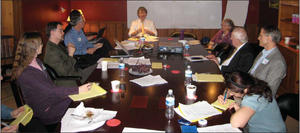Creating Consciousness Within Conflict Resolution Curriculum
Creating Consciousness Within Conflict Resolution Curriculum
 The Institute for Conflict Analysis and Resolution (ICAR) held a one day symposium at Point of View on April 7, 2008, on "Consciousness and Conflict Resolution". The event featured presentations by ICAR Faculty Andrea Bartoli, Susan Allen Nan, Jamie Price, and Solon Simmons. The presentations stimulated lively discussion among additional participating ICAR Faculty, ICAR Advisory Board Members, ICAR doctoral students, the ICAR Director, faculty from other universities, and leading conflict resolution practitioners. A generous grant from the One Foundation made the symposium, and the research that informed it, possible.
The Institute for Conflict Analysis and Resolution (ICAR) held a one day symposium at Point of View on April 7, 2008, on "Consciousness and Conflict Resolution". The event featured presentations by ICAR Faculty Andrea Bartoli, Susan Allen Nan, Jamie Price, and Solon Simmons. The presentations stimulated lively discussion among additional participating ICAR Faculty, ICAR Advisory Board Members, ICAR doctoral students, the ICAR Director, faculty from other universities, and leading conflict resolution practitioners. A generous grant from the One Foundation made the symposium, and the research that informed it, possible.
Susan Allen Nan presented a research paper arguing that at its core, conflict resolution is about increasing consciousness. Consciousness can be seen as the base of conflict resolution theory and practice. Conflict resolution practices are effective to the extent that they support shifts in consciousness. Consciousness raising spreads awareness of the existence of oppression, exploitation, or other lack of respect for the human dignity of an individual or group, and then conflict becomes visible.
Through conflict resolution, participants in conflicts can develop increasing awareness of their own needs, the needs of others, and ways of meeting everyone's needs. In conflict resolution processes, we can shift our understanding of self and other so that we shift from dehumanization to rehumanization, from hatred to compassion, and from a focus on self in isolation to self-in-relationship within an interrelated whole.
Discussion at the symposium was wide ranging. Many comments focused on conflict resolution practices that support shifts in consciousness, as well as the ways shifts in consciousness can shape concrete changes in the material suffering of those involved in conflicts. Solon Simmons highlighted four aspects of consciousness at work in conflict contexts: theoretical, evaluative, narrative, and associative consciousness.
The symposium conclusions outlined many areas for practical research aimed at improving our abilities to resolve conflicts and increase consciousness. Next steps include publishing papers presented at the symposium and planning a broader symposium to engage more diverse perspectives in a deepening of this emerging conversation.
Interested friends of ICAR are invited to join the Consciousness and Conflict Resolution working group to participate in future related activities. Email Susan at [email protected] for more information on the concept of consciousness.




